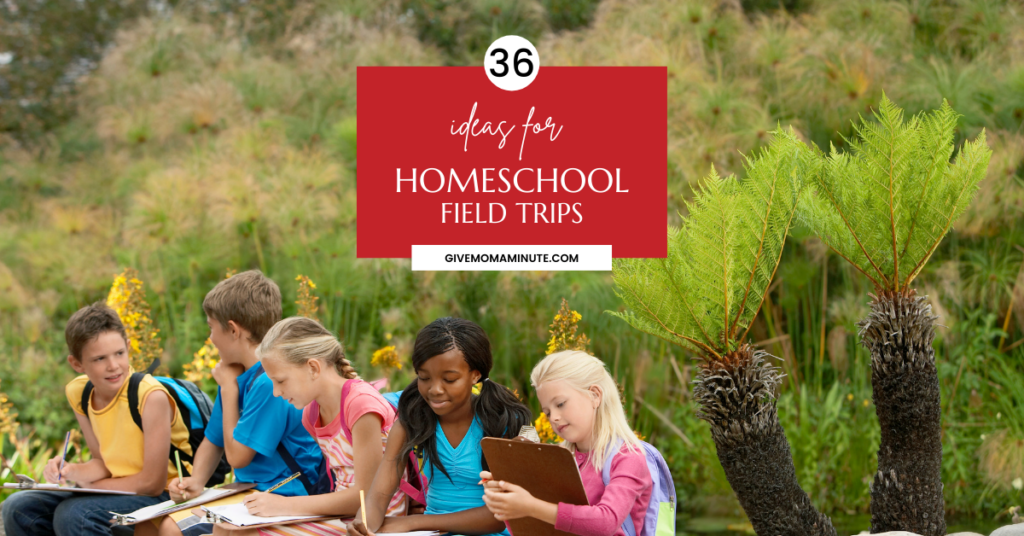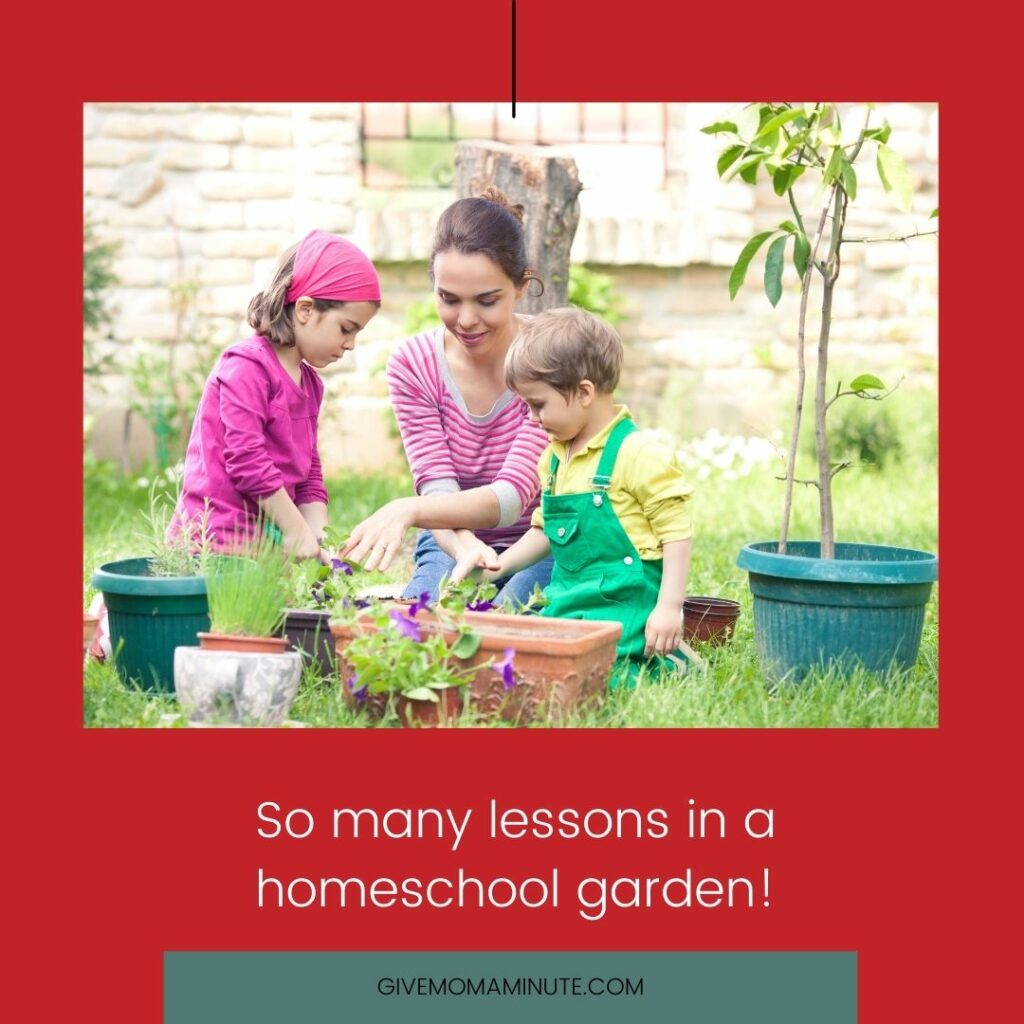Field trips are a great way to break up the days in your homeschool and make learning come alive. Anything can be educational and you might find local gems you didn’t even know existed. These 36 field trip ideas for homeschoolers (one per week) will cover all the bases and can be used for multiple ages.

What Makes a Good Field Trip?
Good field trips will be engaging and allow the kids to get up close and personal with some aspect of your local area. As a homeschool mom you already have plenty of responsibilities on your plate so the best field trip ideas are also simple – don’t overcomplicate it. Like most anything you plan there will be unexpected detours and complications. Try your best to go with the flow – sometimes the best field trips are the ones that don’t go according to As you are brainstorming field trip ideas for homeschoolers, ask the kids to help. You might be surprised what interests them.
How Do You Organize a Field Trip?
When I first started homeschooling I tried a co-op, but it just wasn’t my cup of tea. I wanted some socializing for both me and kids. Our homeschool activities needed be educational, but I also wanted it to be fun! I made friends with 2 other homeschooling moms and between the three of us we had 17 kids. We took turns planning a field trip. Every Friday we would just meet at the specified location. If one mom was having a tough week and couldn’t plan we would trade duties. Sometimes it was more of a park day than a field trip and that was great, too!
Planning the field trip will help keep everyone engaged. Plan the logistics such as time of day and transportation. Don’t forget the snacks! (My kids always joke, “we just came along for the snacks!”) Not everyone will love field trips (snacks or not) and planning it out beforehand will help everyone, including the host, know exactly what to expect. Parents can work together with other families as well. Communication is key. It might work best for one parent to stick with the older kids and another parent to stay with the younger ones, for example.
Good communication with your host will also improve your experience. Be open about the size of the group, your desire for engagement, age range of kids, and any accommodations your group might need. Always confirm the field trip the day before just in case something last minute has come up for you or your host.
One last note about how to planning field trip ideas for homeschoolers – be sure to take turns being the organizer. For example, if you have three families in your group (like I did) you can take turns organizing or turns bringing snacks. However you arrange it, make sure all the work is being delegated to spread out the load of responsibility.
@givemomaminute Favorite homeschool Field trip. Enstroms Candies.#secularhomeschool #small #toffee ♬ Lo-fi hip hop – NAO-K
What are the Benefits of a Homeschool Field Trip?
Field trips can be a great way to build relationships with other homeschoolers in your area. Keep it as structured or as open as you want. Depending on how you organize the field trip, you will most likely find great friends who have similar habits as you.
You will also get acquainted with others in your community, including small businesses, local leaders and your neighbors. Most people are thrilled to share their expertise and experience with the next generation.
You and your kids will be more aware about local challenges, resources and history. You never know what passions or service opportunities you might discover!
36 Ideas for Your Homeschool Field Trips
The majority of these are free homeschool field trip ideas and a few can even be turned into a virtual field trip!
- Bank – Ask your host to let you see the inner workings of the bank. All those pneumatic tubes are fun! The bank might also let you practice counting money or see the top-secret safes. For older kids this would be a great opportunity to learn about investing and personal finance as well.
- Potter – Local potters will be happy to show you the basics of ceramics work and take you through the process from start to finish. It might also be a great opportunity to learn about local clay deposits and how they affect the final coloring.
- Fire Station – This is a great opportunity to learn about fire safety as well as what it takes to have a career in firefighting. Ask if you will be able to sit inside the trucks or try on the equipment.
- Fish Hatchery – Fish hatcheries are so fun because you get to see the fish in all stages of life and usually there is an opportunity to feed them as well. I’ve never paid to get in to a fish hatchery but check locally.
- Dairy Farm – This can be a corporate/commercial dairy farm or a smaller operation. If you have the choice, I strongly recommend going for the small mom and pop version.
- Outdoor Museums – Take a tour through a local outdoor museum. These are usually themed around the local history and run by volunteers who can fill your heads with local lore.
- Stadium Tour – Take a tour of your local football stadium. There’s all kinds of behind-the-scenes opportunities with this one.
8. Audubon Center – If you are lucky enough to live near an Audubon Center you can learn about birds, migratory patterns and conservation efforts. These centers often host bird banding days during migratory periods.
- Theater Presentation – Is a local high school or college doing a theater presentation. Many times they will let local groups come in to watch the dress rehearsal or have a reduced rate for a shortened matinee performance.
- Animal Shelter – This could be done as a tour or as a volunteer opportunity. Your local animal shelter staff can give a presentation about pet care or what to do if you find a lost animal. And who doesn’t enjoy seeing all those cats and dogs?

- Local Co-Op or Orchards – As farmer’s markets and local co-ops become more popular this might be a great one to check out. Time your field trip to coincide with a favorite seasonal product such as tomatoes, peaches or cherries. Some co-ops will allow you to help with the planting, weeding or even harvesting.
- International Festivals – If you live near a university or in a location with strong cultural representations see if there is an international festival near year. It’s a great way to see dances, music, clothing and sometimes food from places all over the globe.
- National Park – National Parks usually have great visitor centers and interpretive sites. Don’t forget 4th graders get in free! The Rangers will also often lead hikes or teach classes about local flora and fauna according to the season.

- Historical Museum – A specific historical museum can be a great way to learn about a specific topic. Some examples might include a dinosaur museum, Civil Rights Museum, Museum of Trains, etc.
- Courthouse – Where do you sit in a courtroom? What do the judge’s quarters look like? What happens in all the departments? Civic engagement lessons are in abundance at the courthouse.
- Planetarium – Seeing the night sky up close and personal is magical. Universities often have planetariums but if there isn’t one nearby you might want to contact a local astronomy club.
- Factory – Do you have any local factories? A good tour will include explanations of the machines, safety protocols and distributions. If there is no large factory nearby you can contact a local small business that makes its own products and take a lesson in entrepreneurship.
- Houses of Worship – Learning about world religions is a great way of promoting understanding and empathy with others around us. If a religious leader is not comfortable having your group in the worship place see if there is a free library room or outdoor space for community use.
- Art Gallery – Focus your tour on one style, artist, or time period. Several art galleries, including the Met, also have virtual galleries and lesson plans.
- Hike – Wherever you live there is most likely a hiking or walking trail nearby (don’t forget those snacks!). You can focus your hike on foraging, tracking animals, bird watching, landscapes and ecosystems.
- Water Treatment Plant – You might need to bring a clothespin for your nose but learning how the water treatment process works is a great way to learn about conservation and water processing.
- Local Indigenous Cultural Center – Whose land are you on? Not every area will have a Cultural Center but make the effort to learn about local indigenous cultures. Learn from a historical perspective but also how they are thriving today. The Ute Museum in Colorado is a great example of indigenous history being retold by members of the Ute tribe.
- Alpaca Farm – Unlike a dairy farm most alpaca farms are specialty operations. They will be smaller and your chance for a hands-on experience. You can enjoy the animals themselves and also learn about the shearing and weaving processes.
- Architecture Tour – Ask a local architect to take you on a tour of your downtown or lead your group through a modeling activity indoors if the weather isn’t cooperative.. A scavenger hunt could also be an engaging way of learning about local history and architecture. This can be easily adapted for all ages.
- Taxidermist – Obviously this isn’t going to be for everyone 🙂 and if you have sensitive kiddos be cautious. However, taxidermy is an interesting occupation and there’s a big educational opportunity here.
- Arboretum – Plan this around Earth Day or spring planting season. You might even end up with a free or affordable sapling to take home!
- Library – I’m sure you and your kids have been to a library before so at first glance this might not be the ultimate thrill. However your local librarian might be willing to show you how books are sorted, what other services are available at the library or even let the kids “volunteer” and shelve a few books.
- Park – This is more about having the space and location than the park itself. Give your excursion a theme – what will you do at the park? Learn about the fish in the pond? A kickball tournament? Play with stomp rockets? Fly kites? Plan your activity to be something that you don’t have the space or people to do at home.

- Geocaching – You look for a mystery box by following coordinates. There is a free and paid version of the Geocache app and it teaches kids about navigation, compass skills and more! (If you decide you love geocaching, the paid version is worth it.) This doesn’t require a host so it could be done last minute as well.
- Local Clubs – Do you have local clubs that meet regularly? Would they consider hosting you for a field trip? Examples might be a quilting club, a chess club, a model train club, an aviation club, etc. These groups are usually organized by older folks in your community who are eager to pass on their knowledge.
- Glass blowing – If you are lucky enough to have a glass blower in your community definitely inquire about a tour. When we lived in a tiny town in South Dakota there was a local glass artist who let people watch her work every day. It was a great experience! If you don’t know a local artist, try inquiring at the local college. If there is a glass blowing class they are usually open to hosting a field trip.
- Landfill or Recycling Center – What happens to everyone’s trash anyway? You will want to communicate with the landfill due to safety issue rather than just trying to take a group out on your own. If the landfill is not an option try to take a tour of a recycling center.
- Homeless Shelter – Consider a service opportunity as a field trip. Your group could volunteer to work in the food pantry or serve food.
- Radio or TV Station – All those buttons to push! I have found local media personnel to be so welcoming and willing to teach kids about their jobs. They might even let you say “HI” live on the air!
- Capitol Building – Even if your state’s capitol isn’t nearby it is worth the trip. There is just something awe inspiring about walking the halls where your state’s leaders have walked before. There’s usually a fun tale or two about some mischievous lawmaker. If you visit the Unicameral in Nebraska while the legislature is in session they will actually recognize your group. It’s a pretty cool experience.
- Airport – Contact your local airport to see what exactly a field trip tour might look like. Due to safety regulations some areas will certainly be restricted. If you can get a tour explaining the process of where the bags go, how they are sorted, how they make it to the next plane or how an air traffic tower works – that would be amazing! If you can’t get too much of behind-the-scenes then it is still fun to see airplanes arrive and depart. You can also use it as a lesson in learning to read time tables and how to navigate an airport so it isn’t overwhelming when they take their first trip.
Phew! Writing this list makes me want to go on an adventure! Hopefully these tips and list have given you a better idea how to organize your homeschool field trip and now you have a few ideas of where to go, too! Have fun experiencing something new in your community and don’t forget to come back and tell me where you went. 🙂





Pingback: Gardening Activities for Kids: A Fun Homeschool Project - Give Mom a Minute
Pingback: How to Find a Secular Homeschool Group Near Me - Give Mom a Minute
Pingback: Nature Study Ideas for Spring - Give Mom a Minute
Pingback: Family Bucket Lists for Homeschoolers - Give Mom a Minute
Pingback: Entrepreneurial Activities for Kids This Summer - Give Mom a Minute